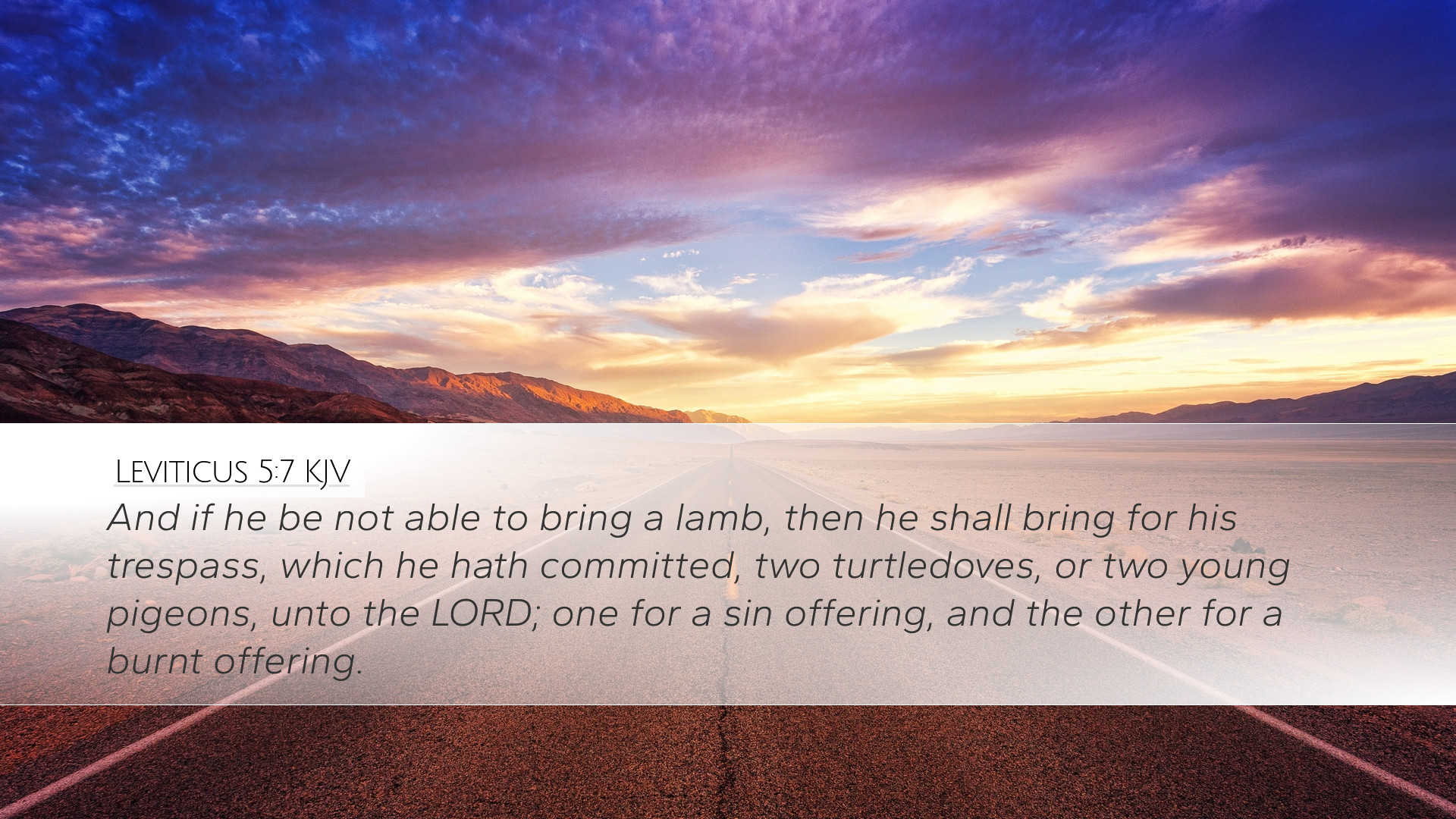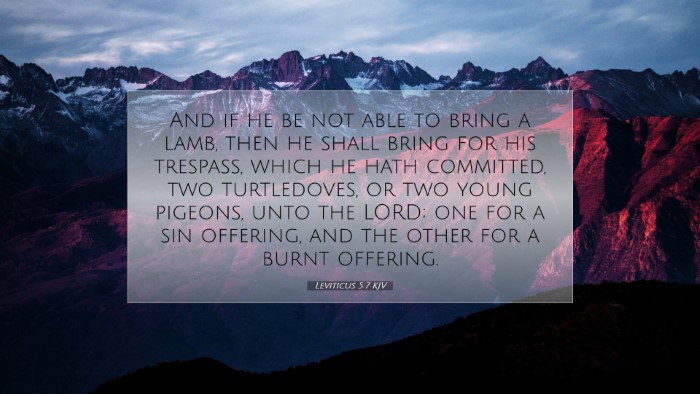Commentary on Leviticus 5:7
Leviticus 5:7 states:
"And if his means be sufficient, let him bring a lamb, or a kid of the goats, for a sin-offering; but if he be not able to bring a lamb, then he shall bring for his trespass which he hath committed two turtle-doves, or two young pigeons, unto the Lord; one for the sin-offering, and the other for the burnt-offering." (KJV)
Introduction
This verse is part of the Mosaic Law which lays the foundation for the sacrificial system in Israel, providing both a means of atonement and a method by which individuals could approach God in repentance and faith. The provisions outlined reveal God's concern for all people, irrespective of their financial capabilities.
Theological Implications
In examining Leviticus 5:7, we can consider several theological implications derived from prominent public domain commentaries:
- God's Justice and Mercy: The accommodation for those unable to afford a lamb underscores God's mercy while maintaining His justice. Albert Barnes notes that God's requirements are not meant to be a burden but rather a means to facilitate a relationship between the sinner and God.
- Inclusivity of the Sacrificial System: Matthew Henry emphasizes that the provision for two pigeons instead of a lamb demonstrates God’s inclusivity; it ensures that even the poor are not excluded from seeking forgiveness and restoring fellowship with God.
- Recognition of Personal Responsibility: Adam Clarke highlights that the law is addressing personal responsibility in the face of sin. By making a provision for varying financial means, it reinforces the belief that all are accountable before God.
- Symbolism in Sacrifice: The sacrifices represented in this verse are not just about the items offered, but they symbolize one's heart and desire for reconciliation with God. The act of bringing a sacrifice reflects the internal acknowledgment of sin and the need for atonement.
Understanding the Offerings
In Leviticus 5:7, the distinction between the sin-offering and the burnt-offering is significant.
- Sin-Offering: The sin-offering is specifically for atonement of sin and signifies the gravity of sin against God. According to Barnes, it represents the acknowledgment of failure and the earnest desire for forgiveness.
- Burnt-Offering: The burnt-offering, on the other hand, symbolizes a complete dedication to God. It signifies total commitment and submission to God’s will, as explained by Clarke. This distinction emphasizes the relational aspect of approaching God—first acknowledging sin, then affirming one’s desire to serve Him wholeheartedly.
Practical Application
The principles presented in Leviticus 5:7 carry profound implications for contemporary faith and practice:
- Accessibility of Forgiveness: The various options for sacrifices remind believers today that forgiveness is accessible to all, regardless of their status or situation. Everyone can come before God, and this reflects God’s unchanging character.
- Heart Posture Matters: While the act of offering is necessary, the heart’s condition is crucial. The sacrifices prescribed in Leviticus could be meaningless without genuine repentance and faith, echoing Matthew Henry’s assertion that the heart is what God seeks.
- Community Responsibility: Churches today should encourage communities to provide support to those in need, ensuring that financial constraints do not hinder anyone from seeking spiritual reconciliation and growth.
- Daily Reflection on Sin: Understanding one’s sin and need for forgiveness is essential. Clarke points out that the details surrounding offerings were reminders for the Israelites to remain conscious of their sinfulness.
Conclusion
Leviticus 5:7 offers profound insight into God’s character and the nature of sin. As we reflect on the provisions for sacrifice, we are reminded of God's justice tempered with mercy, His desire for a relationship with His people, and the accessibility of repentance regardless of one's circumstances. The careful examination of this verse through historical, theological, and practical lenses invites deeper understanding and challenges believers to engage authentically with their faith.


